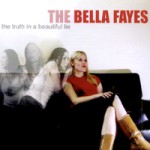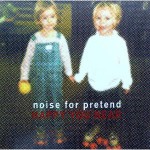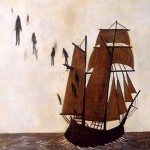 The Bella Fayes
The Bella Fayes
The Truth In A Beautiful Lie
Self-Produced
It’s no secret among local bands that the current Portland live music scene is at an historical nadir. For proof, one need look no farther than the Boregonian’s weekly Local Top 10 records in their Friday A&E section. What once was a bastion for the likes of Calobo, Heatmiser, Elliott Smith, Rubberneck and countless other top-tier local bands, is now populated by out-of-town entities such as the Melvins or Death Cab For Cutie. Local band Pink Martini routinely makes that Top Ten list with Sympathique, a recording that is over four years old! Nothing against Pink Martini, but one would hope that the public could find some other local product to get excited about, other than a four year old record
The reasons for this deplorable state of affairs are manifold: an apathetic public, the rise of the DJ in the local club scene and the fact that no band seems able to muster much of a local following. Perhaps the fact that musicians make no more money for a gig today than they did twenty-five years ago might have something to do with it. Maybe other occupations look more lucrative to today’s potential musicians: such as a job at McDonald’s, or busking: there’s lot’s of money in busking. Whatever the case, the local live music scene seems, sadly, very near-death.
One band that is going against that trend are the Bella Fayes. Leader Lael Alderman made news a few years back when he signed a developmental contract with Geffen Records, which thus far, hasn’t yielded much. Two years ago Alderman formed the Bella Fayes, releasing a very successful EP, So Much More Than ‘Hello,’ a little over a year ago. Local press, radio and even TV have featured the band over the past couple of years. Their renown for playing tight, Beatlesesque power pop spread quickly. By last October their song “White Noise” was one of a dozen songs selected for a nationally distributed ASCAP compilation entitled EAR.
As mentioned in last month’s As The World Turntables, the band recently signed a lucrative contract with Dell allowing the computer manufacturer to include the Bella Fayes tune “Trying To Find A Way,” from the band’s new album, as a demo, promoting the company’s music software. Suh- weet! Dude, y’ur gettin’ a Dell… with the Bella Fayes on it!
This eleven-song outing furthers the band’s status. The songs are tightly knit, well-written, well-executed Pop gems, basically performed live in the studio. Alderman has a knack for crafting memorable Pop hooks, especially on the more uptempo tunes. His vocal delivery is reminiscent of many ‘60s British invasion singers. The band, whom were never slouches have ratcheted up the musical presentations another notch, displaying keen musical maturity.
The first track, “Feel Like I Wanna Feel,” is a classic rocker that throws Alderman’s many skills into clear relief. His gritty vocal, distorted in the mix, scats a rap that calls to mind Dylan’s “Subterranean Homesick Blues,” in the verses, with a nod to Bowie’s “Suffragette City” in the chorus. Drummer Shane Fisher lays down a clean, hard-hitting beat, over which Davey Hall (formerly with Thrillbilly) contributes a punchy bassline. Meanwhile, Jason Henry adds jagged lead guitar across Lael’s craggy rhythm guitar. Henry cuts loose with a fiery, ‘60s garage-influenced solo, to cap off a great opening tune.
“Wake It Up” is a simple song, nicely punctuated by Fisher’s tom-driven beat, coupled with Hall’s eighth-note basslines in the verses. Henry adds a nifty, middle-Eastern flavored guitar figure in the chorus, which lodges indelibly in the brain. A four-to-the floor rhythm drives the familiar Jellyfish-like melody of “Tables Will Turn.” Alderman mutters the lyric, with a vaguely Bri’ish, cockney sneer, reminiscent of Billie Joe Armstrong of Green Day. “May think the past is behind you/’til someday it finds you/Though all of your bridges have burned/And the bed that you made/With the plans that you laid/Show just how little you’ve earned.”
The aforementioned Dell-distributed “Trying To Find A Way,” is a confectionery slice of rock ‘n’ roll worthy of the sons of Cheap Trick. Echoing Klaatu’s “Calling Occupants…”, the song is an anthem to some sort of indistinct DIY army, fighting against the status quo and the powers that be. “Calling all of those/The truth won’t hurt the one who knows/Trying to find a way…/Calling all radio/We’ve changed our minds and we’ll go it alone/Trying to find a way.” And there you have it. If that doesn’t demonstrate some software, then who knows what will?
Beatles influences abound in “Poolside,” a slower number, which features occasional three-part vocal harmonies. But, especially when measured against the first four songs on the album, it fails to make as big an impact. More or less the title track, “New Shame” contains the thought provoking line: “ The truth is a beautiful lie/The empty answer to the question why.” Well, here here. But be that as it may, the song faintly recalls Matthew Sweet or Third Eye Blind with a hint of Mother England thrown in. Not bad.
A wonderful staggering waltz, “Channeling” could pass for an early Gin Blossoms song, with supple harmonies over an impassioned performance. Henry’s guitar squawks and squeals pinion powerful power-chords through an intricate march. Great.
An interesting and brief song, “Shortcut” moves in an unorthodox round that nicely captures its self-enclosed subject matter. Another balls-out rocker, “Come” swaggers and blusters, while sounding at times like later-period U2, before breaking into a transient ‘60s Who-like section, where Henry gives a short display of his keyboard prowess.
As with “Tables Will Turn,” “The Girl Most Likely To” utilizes an aggressive march rhythm and a certain Jellyfish-ish musical sensibility. Henry’s ineffable organ accents add nice punctuation. The ballad “In The Transistor’s Glow” maintains a certain country twang, with acoustic and slide guitars adding to the effect.
There is not a bad song among the eleven presented here. And there are several that stand out as truly memorable. Lael Alderman and the Bella Fayes would seem to be a band with a bright future, although, as outlined in “Trying To Find A Way” it would appear that they wish to dictate that future on their own terms. If any band can do it, these guys can.
 Noise For Pretend
Noise For Pretend
Happy You Near
Hush Records
We first met the young trio Noise For Pretend last November, with their split EP with Blanket Music. Two of the songs, “Money Penny” and “Pants With His Halfway Down,” among the four presented on that EP, are reprised here. In addition there are nine new songs. And, as before, the focus of the presentation is the captivating voice of Esperanza Spalding. Still a teenager, Esperanza has the voice and vocal phrasing of a woman two or three times her age.
Accompanied by drummer Christian Cochran and guitarist Ben Workman (who sings three of the eleven songs), Esperanza caresses each tune with a voice as sonorous and dusky as a tenor sax. Compared to Bebel Gilberto, Esperanza also recalls Astrud Gilberto, Julie London and Sarah Vaughan, imparting each song with a smoldering, detached quality that positively steams up the pits on the compact disc.
Beyond that, Esperanza is an accomplished double-bassist, coaxing a variety of nuances from the cumbersome instrument. Together, the members of the band create a trendy, space-age bachelor pad sort of sound that is equal parts Brazilian bossa nova, cool jazz, blues and even a pop sensibility heretofore unexplored.
“The Song Formerly Known As Whatever We Used To Call It” is a ghostly jazz-inflected number, with a slightly frenetic quality, generated primarily by the bass. Esperanza’s soulful vocals exhibit a rapidly growing assurance and maturity (the first three songs were recorded only just last February) over material recorded last year. However, the ingenuous siren-call of her voice remains distinctly intact.
Likewise, the swinging, 12/8 scheme of “Due To Lamplooking” allows the group to explore a lively setting, with Esperanza evoking Dinah Shore and Doris Day with stylish aplomb. Sumptuous. But “Go Figure, Another Warm Day In Paradise” is a complete departure for the band. Sounding sort of like the Cranberries, without the brogue, the band strikes a winning pose— with Esperanza coolly delivering a winsome vocal. An electric piano figure and synth string pads add depth and dimension to the presentation. A charming song; and quite radio friendly (as the band glibly announces in the CD booklet).
Workman takes over the vocal duties on “Melatonin Head.” Ben’s slightly adolescent voice is not as appealing as Esperanza’s, but he does quite well with what he has all the same. Cochran’s restrainedly explosive drumwork adds power to the otherwise quiet song. As was mentioned earlier, “Money Penny” could easily work as a James Bond-like spy theme. Workman’s guitar colorations are especially imaginative here. Esperanza’s sexy vocal adds to the milieu.
An element of Nancy Sinatra hovers around the motorbike mayhem of “Red Wagons Aren’t Very Long.” Spalding’s bass interplay with Workman’s palm-muted guitar pluckery is a thing of beauty. “Corduroy” is a moody ballad which finds Esperanza exploring the lowest part of her lowest register in sultry fashion, while Workman demonstrates stalwart sensibilities with superlatively rendered guitar inventions. Workman’s vocal on “Seven Dead Kids” starts out as a sort of rap, before displaying a delicate melody in the chorus. A slightly schizophrenic tune.
“Pants With His Halfway Down” is an alluring little tango. Esperanza weaves a spell with her insouciant vocals and dynamic basswork, over Cochran’s expert drum articulations. Workman returns to take the lead vocals on “Blisters,” another song that changes gears a few times through the course of the arrangement. Esperanza lends rare harmony backup vocals in the chorus. The final cut, “Evil Petting Zoo,” is a gentle ditty in 3/4 time, nicely arranged, with a faint European feel to the proceedings.
Noise For Pretend show great gains in a short time, offering a world of promise for their future. Esperanza Spalding has special talents that deserve to be heard by a much wider audience. The band’s material is offbeat, too be sure, which precludes the sort of instant success one might expect from such monumental abilities. But the fact remains that, despite the fact she’s taking the slow road, hers is a talent that will one day accrue widespread recognition. The band she plays in is pretty exceptional as well.
 The Decemberists
The Decemberists
Castaways And Cutouts
Hush Records
In the 70’s there was a British folksinger named Al Stewart, who eventually scored a hit with the song “Year Of the Cat” in 1976. But before that, Stewart spent a few years writing “history songs,” songs whose lyrics contained vast amounts of historical information. Perhaps Stewart’s finest achievement along that line was the song “Roads To Moscow,” an eleven minute opus that told the tale of a German soldier caught behind Russian lines in World War II.
Stewart’s ability to fuse historical accuracy with a gripping storyline was duplicated only by Gordon Lightfoot’s “Wreck Of The Edmund Fitzgerald,” which wasn’t half the song that Stewart’s was. Others had already explored the short story angle. Paul McCartney recorded “Eleanor Rigby in 1966 and Elton John came forth with “Where To Now St. Peter?” in 1970. And threads of those songs weave through the eleven presented here.
Singer/songwriter Colin Meloy carries on that storytelling tradition with the Decemberists, a band that is comprised of a few former members of Calobo: Nate Query who adds occasional upright bass and keyboardist Jenny Conlee. Meloy may or may not be Bri’ish, but he has a scouse as thick as a Hasty Pudding. Oy! This adds distinctive coloration to the Dickensian splendor of his short stories. For one thing is certain— Colin Meloy is a true wordsmith of the very highest order.
Many of Meloy’s songs seem as if they are remembrances from former lives. They are haunted tales, seemingly being told by ghosts; telling of days and times long ago. It’s a powerful artistic medium, if a little eerie and strange.
“Leslie Anne Levine” is a perfect case in point. A splendid imitation of Edward Arlington Robinson ensues. “My name is Leslie Anne Levine. My mother birthed me down a dry ravine. My mother birthed me far too soon. Born at nine and dead at noon.” The story goes on to state: “On the roofs above the streets, the only love I’ve known is a chimney sweep lost and lodged inside a flue back in eighteen forty-two.”
Musically, Meloy enters the scene on a fluid acoustic guitar, joined by Conlee on accordion and drummer Ezra Holbrook. Meloy sings the lyric in a nasal drone, quite like that of the aforementioned Al Stewart, though it is uncertain whether our young Colin could possibly know of his predecessor.
Similarly, though, “Here I Dreamt I Was An Architect” rides upon Colin’s homely vocals and buoyant acoustic guitar, soon joined by lead guitarist Chris Funk and Conlee on electric piano and Hammond organ. It’s Colin’s “Year Of The Cat,” to be sure. Meloy tosses a little sneer into his delivery and sounds more like Liam Gallagher of Oasis on “July July,” a feat which he duplicates on “Odalisque.”
Conlee’s accordion shows up again on the bawdy “A Cautionary Tale,” a sort of sick joke about yer mother. It’s a Russian folk flavored number. Puerile and profane, but well written and performed, all the same. The accordion adds a more Western European touch to the suite “Odalisque.” As Meloy strikes a disdainful, Liam Gallagher-like vocal stance, the song structure and arrangement reflects a more modern approach; breaking into a prog-rockish midsection, augmented by Conlee’s soulful organ fills and Funk’s sterling guitar interplay.
The tender story that is “Grace Cathedral Hill” is possibly the best love song about the city since Tony Bennett’s “San Francisco.” Conlee’s sad organ tolls mournful tones, supporting Colin’s most focused song of all. His unique phrasing wherein he begins one melodic line with the end of the preceding lyric, draws the listener into his frame of reference. “We were both a little hungry so we went to get a hot dog down the Hyde St, Pier. The light was slight and disappeared. The air it stunk of fish and beer.” A gorgeous, unusual chorus adds brilliance and luster. Another stand out song.
“The Legionnaire’s Lament” could almost pass for a Bella Fayes song, heavily accenting all four beats behind a dark, McCartneyesque ditty about a soldier dying in the desert. “Medicating in the sun with pinch doses of laudanum, longing for the old fecundity of my homeland. Curses to this mirage! A bottle of ancient shiraz. The smattering of distant applause is ringing in my poor ears,” Eminem it ain’t.
Funk lays down an atmospheric pedal steel guitar behind the simple folk offering “Clementine.” Query bows his bass adding a cello-like drawl to the lazy sun-drenched “California One,” a song that should appeal to the Sonoma county Chamber of Commerce. Through the course of an extended jam, the song evolves into “Youth And Beauty Brigade,” the sort of club Max Fischer might form in the movie Rushmore.
Colin Meloy and the Decemberists create a world of their own; a world where the ribbon of time wraps in a curious bow; where the past and present are inextricably intertwined. Meloy is a gifted poet and storyteller. And, with two certifiable “hits” among the bunch, and a high level of quality in craft and performance throughout, the band (if it is indeed more than just a backup band behind a solo artist) maintains a delicate balance between the aura of Bronte-like windscapes balanced against a few, more personal, introspective pieces. Meloy is a true talent. Where he goes from here with that talent is not yet entirely clear. But, more songs like “Grace Cathedral Hill” and “Here I Dreamt I Was An Architect” will ensure his procession toward greatness.
